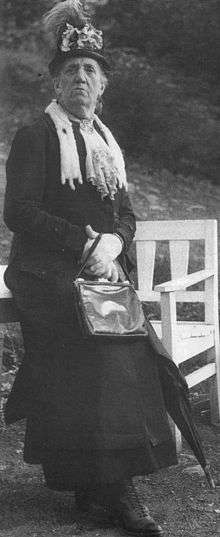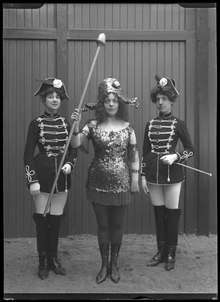Julia Cæsar
Julia Maria Vilhelmina Cæsar (28 January 1885 – 18 July 1971) was a Swedish actress.[1] Her acting career spanned from 1905 until 1968, during which time she appeared in a large number of revues, plays, and films.[2]
Julia Cæsar | |
|---|---|
 Julia Cæsar in 1960, as "Skräcktanten" in the stage version of Kvartetten som sprängdes | |
| Born | Julia Maria Vilhelmina Cæsar 28 January 1885 Stockholm, Sweden |
| Died | 18 July 1971 (aged 86) Stockholm, Sweden |
| Occupation | Actress |
| Years active | 1905–1968 |
Early life
Cæsar was born at Östermalm in Stockholm in 1885. Her father, Gustav Cæsar, was a sergeant belonging to the Royal Svea Life Guards. At the time, Östermalm was a poor part of Stockholm, and Cæsar had a difficult childhood where she periodically had to stay in different foster homes, and sometimes she also lived with her uncle, August Cæsar, who was a prison guard at Långholmen prison. At the age of 12, she had to leave school and start working as a delivery girl in a shop.[3]
Career
Cæsar was interested in the theatre from a very early age, and she would run errands for actors and help out behind the stage in the evenings and on weekends, when she was not at work.[3] She started to get small parts as a background actor when she was 16 years old, and in 1905 she got her first speaking part, as a 100-year-old woman in a revue by Emil Norlander at the Kristallsalongen theatre.[4] She continued to get increasingly important parts, mainly in revues and popular light plays.
Except for the period 1913-1919, when she was at the Apollo Theatre in Helsinki, Cæsar remained in Stockholm where she worked at theatres including the Pallas Theatre, the Odeon Theatre, Södra Teatern, Mosebacke, as well as open-air stages at Tantolunden and Rålambshov.[1][3]

Cæsar's film career began in 1913 with a small uncredited part in Victor Sjöström's Ingeborg Holm, and she also had a background part in Sjöström's 1921 film Körkarlen.[5] Her first substantial film role, which became her movie breakthrough, was in the 1922 film Anderssonskans Kalle directed by Emil Norlander. She became a prolific film actor, with more than 130 roles to her credit.[2]
Throughout her career, Cæsar played a variety of parts, but she became most strongly associated with a particular type: the crusty old woman with a (sometimes well-hidden) heart of gold. She had a very strong voice, which was imperative when working at an open-air theatre, and when she played revues at Tantolunden's theatre she learnt to time her lines so they would not be drowned by the trains passing nearby.[4]
In 1967, at the age of 82, Cæsar's recording of the song Annie från Amörka charted at Svensktoppen, making her the oldest artist to feature on that chart.[3]
Personal life
Cæsar never married. She lived together with the operetta singer Frida Falk until the latter's death in 1948, after which Cæsar kept Falk's ashes in an urn on her mantelpiece.[3]
On 28 June 1968, Cæsar had a stroke, immediately before she was scheduled to perform Annie från Amörka at Skansen. She never recovered entirely, and was mostly bound to her bed for the last years of her life.[5] She died in 1971, and is buried at Bromma Church.
Selected filmography
- Her Little Majesty (1925)
- Black Roses (1932)
- His Life's Match (1932)
- Our Boy (1936)
- He, She and the Money (1936)
- Thunder and Lightning (1938)
- Her Little Majesty (1939)
- Hanna in Society (1940)
- Dolly Takes a Chance (1944)
- Fram för lilla Märta (1945)
- Crisis (1946)
- It Rains on Our Love (1946)
- Onsdagsväninnan (1946)
- Each Heart Has Its Own Story (1948)
- Pippi Longstocking (1949)
- Åsa-Nisse on Holiday (1953)
References
- "Julia Cæsar". Nationalencyklopedin. Retrieved 14 July 2018.
- "Julia Cæsar". The Swedish Film Institute. Retrieved 14 July 2018.
- Norlén, Ingmar (28 December 2016). "Är kärringarna elaka så gör jag dem lite roligare". Land. Retrieved 13 April 2020.
- Hellbom, Thorleif (27 May 1994). "Tantos nya scen på klassisk mark". Dagens Nyheter. Retrieved 14 July 2018.
- "Caesar, Julia". Myggans Nöjeslexikon.